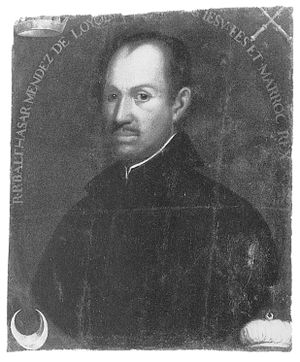Balthasar Loyola Mandes Collection

Huile sur toile, 0,61x0,54. Toulouse Résidence.
Provenance: Peut-être le tableau peint à Béziers en 1667 et remis "à l'epoque révolutionnaire dans la famille de Saune" qui le possédant en 1910. Restitué ou donné à la nouvelle Résidence de Toulouse après 1910. (Les Jésuites aux XVIIe et XVIIIe siècles : expression du baroque. Toulouse, 1991)
Introduction
The Gregorian Centre for Interreligious Studies in cooperation with the Historical Archives of the Pontifical Gregorian University (APUG)started a project to enhance the unpublished writings of Baldassarre Loyola Mandes S.J. (1631-1667).[1] Son of the king of Fez (Marocco), Muley Mohammed el-Attaz a Muslim prince converted to Christianity, after he was capture by the Knights of Malta, while he was travelling to Mecca for pilgrimage. He took the name of Baldassarre Loyola Mandes to honor both the day of his baptism (July 31, 1656, feast of Saint Ignatius of Loyola) and the knight who made him prisoner and who was his godfather (Balthasar Mandols). A few years later, the 11th General Congregation of the Society of Jesus, gathered in Rome, authorized his admission to the novitiate at Saint Andrew at the Quirinal (1661). Desiring to leave on a mission to the empire of the Great Moghul, he died in Madrid at the beginning of his journey. His life, well known in the first Society, was staged by Pedro Calderón de la Barca and it was played in all the Jesuit colleges. Baldassarre was the only former Muslim admitted to the Society of Jesus until the abolition in 1946 of the decree of the 5th General Congregation (1594), which forbade the admission of net-converts.
Ongoing works
Today APUG holds most of the Loyola Mandes's survived manuscripts, containing letters and devotional works. This collection will be digitalised, transcribed, annotated and made available to researchers through GATE. This work started in 2017 thanks to the collaboration of dr. Federico Stella during a traineeship within the Torno subito program, funded by the Regione Lazio.
The collection
The collection consists in a group of miscellaneous manuscripts signed with the call number APUG, Ms. 1060 I-IV.[2] This corpus contains about 300 letters and several other documents: among them there is also a Loyola Mandes's autobiography. The documentation is mostly in Italian, but there are some Latin and Arabic texts too.
To search within the whole content of the Balthasar Loyola Mandes Collection, use the following search module.
Manuscripts
Among the Loyola Mandes's manuscripts there is a codex of 50 sheets, probably written by himself, containing the following texts:
- Oratio contra Mahomettem, et eius sectatores. Scripta à Patre Balthassare Loyola Mandes Societatis Jesu 1665 (APUG, Ms. 1060 IV, pp. 1-44)
- Copia d'una lettera arabica mandata da un Turco Fessano al Padre Baldassare Loyola Mandes della Compagnia di Giesù nell'anno 1664. La qual lettera fù voltata in Italiano dal medesimo Padre nel Collegio di Genova verso il fine d'Agosto 1664 (APUG, Ms. 1060 IV, pp. 45-51)
- La risposta del Padre Baldassare Loyola Mandes della Compagnia di Giesù alla predetta lettera del Turco fessano (APUG, Ms. 1060 IV, pp. 52-98)
These documents has been transcribed according to the rules adopted in GATE, which include the mark-up of the text using several TEI tags to highlight textual phenomena such as abbreviations, deletions, gaps etc.; then the text has also been annotated with critical annotations and semantic annotations. The latter allow to identify portions of the text such as names, places and works and to link them to specific pages.
To access to the annotated transcriptions click on the title of the texts listed above; at the following link it is also available a diplomatic transcription of all the texts mentioned above: APUG 1060 IV.
It is also possible to make a full-text search of the manuscript, using the following search form.
Correspondence
Today, the database contains metadata of 260 of about 300 letters.
3.3% completed
To search the text of the letters, use the following search module.
Bibliography
Infine il progetto prevede la realizzazione di una bibliografia ragionata, corredata di concetti chiave (key concept), per stabilire poi possibili keywords, e di schede di lettura in modo che, definito lo status quaestionis, si possano problematizzare questioni, e tracciare la mappa dei concetti fondamentali e i loro mutamenti nel tempo.
Acknowledgements
This project wouldn't be started without the collaboration of father Laurent Basanese S.J., director of the Gregorian Centre for Interreligious Studies; prof. Emanuele Colombo (DePaul University) and Federico Stella (Gregorian University - University of Naples "L'Orientale") provided most of the transcriptions: to them goes our sincere gratitude.
References
- ↑ For the meaning of the word enhancement, see the Introduction of Monumenta Concilii Tridentini.
- ↑ A description of the collection is available on MANUS OnLine at this link.